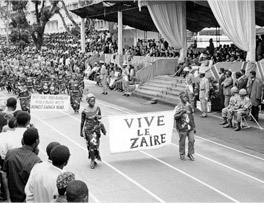THE MOBUTU YEARS
 The call for authenticityColl. RMCA The call for authenticityColl. RMCA |
The call for authenticity and Zaireanization
Congo is politically independent. Now Mobutu wants cultural and economic independence. The call for authenticity marks the break with the imported and imposed culture of the colonial power: its aim is to erase all traces of the colonial era and reclaim what is 'authentically Congolese'. Every Congolese born to a Congolese parent becomes a Congolese citizen: in this way, those who are not recognized by their European fathers are included in the Congolese nation. The country, the river, the currency, the cities and the Congolese themselves each take a 'Congolese' name. Men wear the abacost (short for the French 'à bas le costume', 'down with the suit') and women wear pagne. Mobutu rejects democracy and multipartyism by appealing to 'Bantu traditions'. At the same time, he allows women the political power they were denied by the colonial regime: they can vote and be nominated for positions in government, administration and the MPR (Mouvement populaire pour la Révolution). Supporting women and musicians is at the heart of authenticity: Mobutu uses pagne, music and dance as propaganda tools. The authenticity to which he refers is largely the product of colonization and relations with Europe. Two years after taking power, Mobutu nationalizes the Union Minière du Haut Katanga, which becomes Gécamines. In 1974, all businesses are nationalized. The same year, the country experiences an economic crisis, and the new owners of economic and financial assets are not sufficiently prepared to manage businesses. Zaireanization is a failure and Mobutu is forced to return to a mixed economy. |


